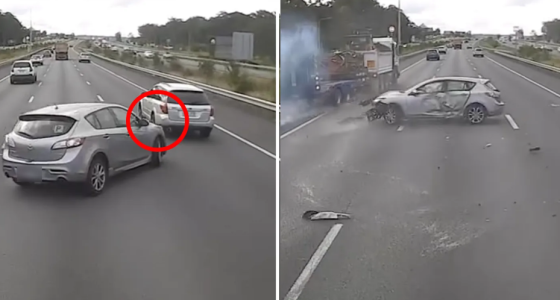Drivers report alarming changes in road safety, sparks widespread discussion and concern
By
- Replies 27
As the roads become busier and the pace of life seems to quicken, it's no surprise that stress levels are rising.
However, a worrying trend has been emerging on Australian roads, one that's not only concerning but downright dangerous.
A recent survey has revealed a startling admission from Aussie drivers: an increasing number are feeling compelled to carry weapons to defend themselves against potential road rage attacks.
This alarming trend has been particularly noted in Queensland, where the RACQ’s Annual Road Safety Survey has highlighted a significant uptick in aggressive driving behaviour.
A staggering 84 per cent of motorists feel that road aggression is escalating, a figure that has jumped 10 per cent since 2020.
What's even more disturbing is that 7.6 per cent of those surveyed admitted to keeping a weapon in their vehicle.
This is a considerable increase from the 4.8 per cent reported last year and should give us all pause.
The RACQ’s Road Safety and Technical Manager, Joel Tucker, described this revelation as 'particularly concerning.'
The survey also shed light on the aggressive behaviour drivers resort to.
Tailgating remains the most common act of aggression, followed by car horns and hand signals.
However, there has also been a 'significant' rise in drivers cutting off others, slowing down deliberately, and even getting out of their cars to confront other motorists on foot.
While most drivers try to stay calm and avoid confrontations, there's a worrying increase in those who say they would 'respond similarly' to aggression, up five per cent from last year.
This tit-for-tat mentality can only lead to more hostility and potential accidents on the road.
Mr Tucker's message to Queenslanders is clear: 'There is no place for aggression on our roads.'
He reminded us that roads are hazardous enough without the added danger of road rage. Patience and a level head are crucial, as the consequences of impatience or anger can be severe, even life-changing.
The human cost of road rage is all too real, as evidenced by the harrowing experiences shared by individuals like Emma Evans from Caboolture.
She recounted a terrifying encounter with an aggressive ute driver on the Bruce Highway, an ordeal that lasted 30 minutes and could have ended in tragedy.
A Finder survey earlier this year found that 74 per cent of Australian respondents admitted to engaging in dangerous driving behaviours known to cause accidents and fatalities.
Tragic stories, such as the Sydney man who died after an alleged road rage incident and a Queensland mum left with two broken legs after an altercation, underscore the severity of the issue.
Diane McMurtrie, president of Hannah’s Blue Butterflies Road Safety Awareness, succinctly stated, 'Road rage is futile, dangerous, and selfish.'
She reminds us that every time we start our cars, we're in control of a 'loaded weapon.'

How do you deal with aggressive drivers, and what helps you stay calm while driving? What changes could your community make to promote safer driving and reduce road rage? Let us know in the comments below.
However, a worrying trend has been emerging on Australian roads, one that's not only concerning but downright dangerous.
A recent survey has revealed a startling admission from Aussie drivers: an increasing number are feeling compelled to carry weapons to defend themselves against potential road rage attacks.
This alarming trend has been particularly noted in Queensland, where the RACQ’s Annual Road Safety Survey has highlighted a significant uptick in aggressive driving behaviour.
A staggering 84 per cent of motorists feel that road aggression is escalating, a figure that has jumped 10 per cent since 2020.
What's even more disturbing is that 7.6 per cent of those surveyed admitted to keeping a weapon in their vehicle.
This is a considerable increase from the 4.8 per cent reported last year and should give us all pause.
The RACQ’s Road Safety and Technical Manager, Joel Tucker, described this revelation as 'particularly concerning.'
The survey also shed light on the aggressive behaviour drivers resort to.
Tailgating remains the most common act of aggression, followed by car horns and hand signals.
However, there has also been a 'significant' rise in drivers cutting off others, slowing down deliberately, and even getting out of their cars to confront other motorists on foot.
While most drivers try to stay calm and avoid confrontations, there's a worrying increase in those who say they would 'respond similarly' to aggression, up five per cent from last year.
This tit-for-tat mentality can only lead to more hostility and potential accidents on the road.
Mr Tucker's message to Queenslanders is clear: 'There is no place for aggression on our roads.'
He reminded us that roads are hazardous enough without the added danger of road rage. Patience and a level head are crucial, as the consequences of impatience or anger can be severe, even life-changing.
The human cost of road rage is all too real, as evidenced by the harrowing experiences shared by individuals like Emma Evans from Caboolture.
She recounted a terrifying encounter with an aggressive ute driver on the Bruce Highway, an ordeal that lasted 30 minutes and could have ended in tragedy.
A Finder survey earlier this year found that 74 per cent of Australian respondents admitted to engaging in dangerous driving behaviours known to cause accidents and fatalities.
Tragic stories, such as the Sydney man who died after an alleged road rage incident and a Queensland mum left with two broken legs after an altercation, underscore the severity of the issue.
Diane McMurtrie, president of Hannah’s Blue Butterflies Road Safety Awareness, succinctly stated, 'Road rage is futile, dangerous, and selfish.'
She reminds us that every time we start our cars, we're in control of a 'loaded weapon.'
Key Takeaways
- A concerning increase in Queensland drivers admit to carrying a weapon for protection against road rage incidents.
- Aggressive behaviour on the roads, such as tailgating, horn honking, and aggressive hand signals, is perceived to be getting worse by an overwhelming majority of drivers.
- RACQ emphasised that aggression has no place on the road and urges drivers to maintain a cool head to ensure everyone's safety.
- Instances of road rage have had severe and traumatic consequences for victims, with some even resulting in injuries or death.









